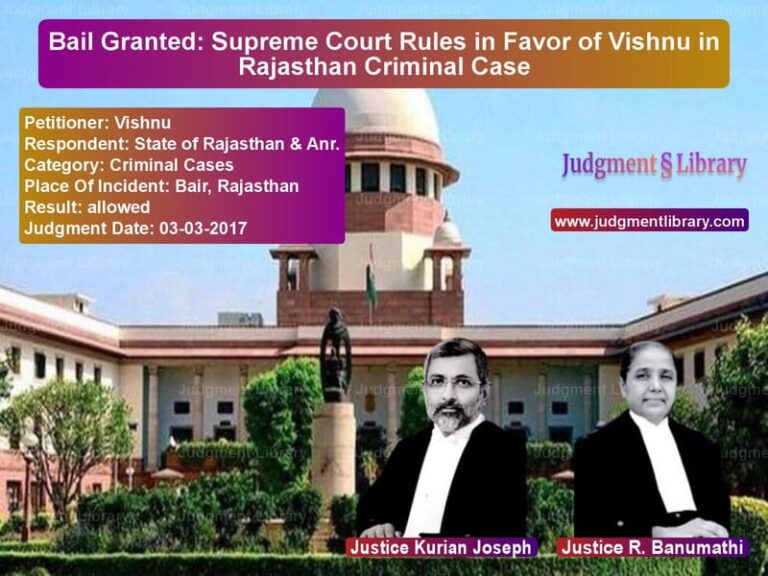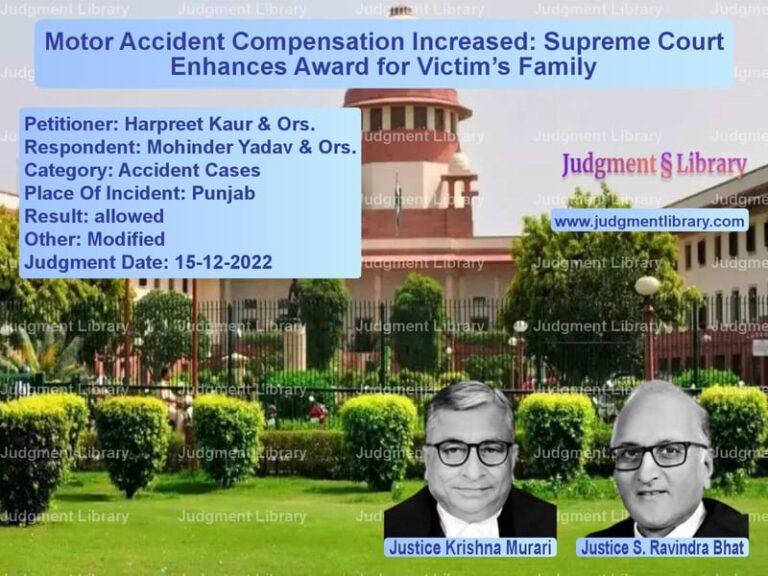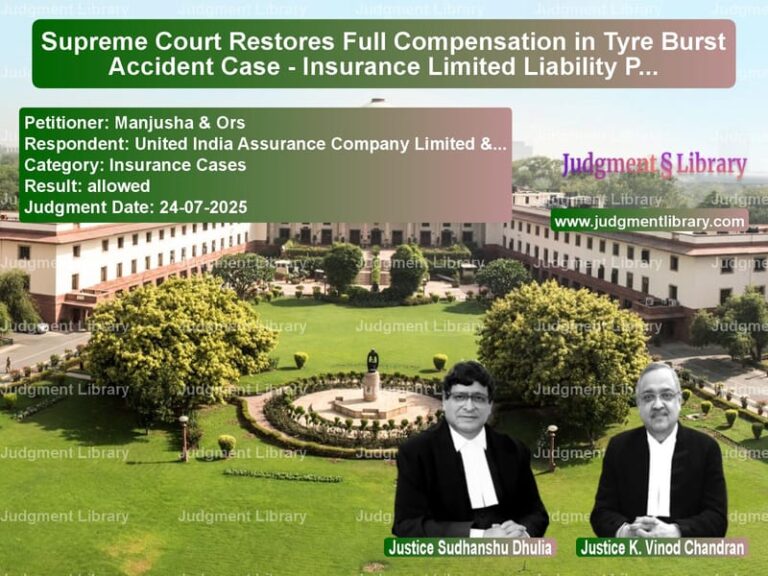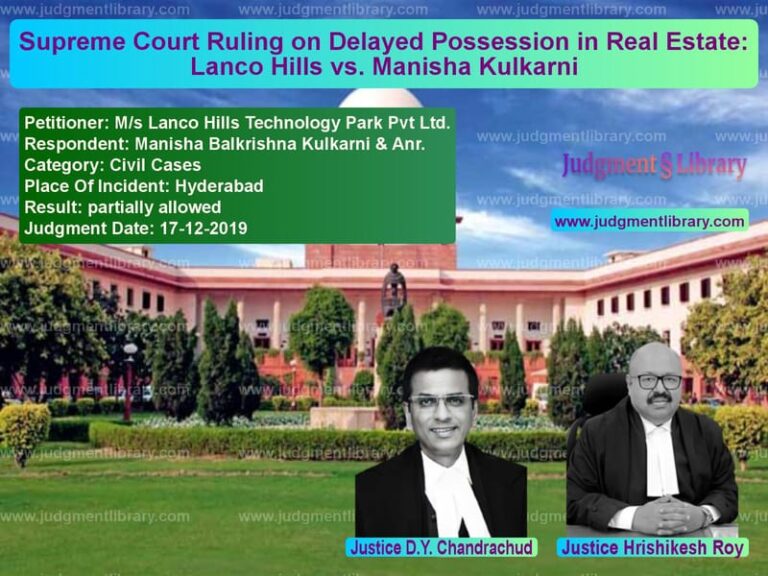Supreme Court Orders Compensation for Land Acquisition in Himachal Pradesh: Key Legal Takeaways
The Supreme Court of India recently ruled in the case of State of Himachal Pradesh & Ors. vs. Rajiv & Anr., addressing a long-standing land acquisition dispute where the state government had utilized private land for road construction without acquiring it through legal procedures or compensating the owners. The Court ruled in favor of the landowners, directing the state to pay compensation in accordance with the market price prevailing at the time of deemed acquisition.
Background of the Case
The case involved land used for constructing a road from Banuti to Pahal in Himachal Pradesh. The original landowners filed a writ petition in 2016, claiming that the state had used their land since 1996 without following due process and without providing any compensation.
The petitioners sought the following reliefs:
- Directions to the state government to initiate land acquisition proceedings and provide compensation.
- An order restraining the state from using their property without legal authorization.
- Alternatively, an order for the return of the land if no compensation was paid.
The state opposed the claim, arguing that the landowners had voluntarily given up their land for road construction and had agreed not to seek compensation.
Petitioners’ Arguments
- The petitioners contended that the government had forcibly taken possession of their land without initiating acquisition proceedings.
- They argued that the state was legally bound to provide compensation under the Land Acquisition Act, 1894.
- The landowners denied any written or verbal agreement to surrender their property without compensation.
- They relied on the Supreme Court’s ruling in Sukh Dutt Ratra vs. State of Himachal Pradesh, where the Court held that the state could not evade its duty to compensate landowners for expropriated land.
Respondents’ Arguments
- The State of Himachal Pradesh argued that the landowners had willingly given up their land in the interest of public welfare.
- The government claimed that the road was built upon the request of local residents, including the petitioners.
- The state further contended that the writ petition was filed after 21 years, making it barred by delay and laches.
- They maintained that no written record was available to prove the landowners’ current claims for compensation.
Key Observations by the Supreme Court
The Supreme Court analyzed the case based on constitutional rights, land acquisition laws, and past precedents. It made the following key observations:
- The state had failed to follow due process under the Land Acquisition Act, 1894, which made its actions unlawful.
- The Court ruled that the absence of written consent from the landowners meant the state could not justify taking their land without compensation.
- It emphasized that even if there was a long delay in filing the petition, the landowners could not be denied their constitutional right to compensation.
- The Court set the deemed acquisition date as May 17, 1996, when an earlier notification was issued for acquisition but later lapsed.
- The state was directed to calculate and pay compensation based on the market price as of May 17, 1996, with all statutory benefits except interest from 1996 to the filing date of the writ petition.
Judgment
The Supreme Court ruled in favor of the landowners:
- The state was ordered to treat May 17, 1996, as the deemed date of acquisition.
- Compensation was to be calculated based on the market price in 1996.
- The landowners were entitled to all statutory benefits under the Land Acquisition Act, except interest from 1996 until the filing of the writ petition.
- The government was directed to complete the compensation calculation and payment process within six months.
Implications of the Judgment
This ruling has significant implications for land acquisition law:
- Strengthening Landowners’ Rights: The judgment reinforces that no government can take private land without due process and compensation.
- Balancing Public Interest and Private Rights: While the Court acknowledged the public utility of the road, it also ensured that private landowners were not deprived of their property without legal recourse.
- Addressing Delay and Laches in Land Disputes: The Court ruled that a delay in filing a claim does not absolve the government of its obligation to pay compensation.
- Establishing Precedent for Future Cases: This decision will guide courts in similar disputes where governments have taken land without following legal procedures.
Conclusion
The Supreme Court’s ruling in this case is a landmark decision upholding the fundamental rights of landowners. By directing the Himachal Pradesh government to compensate landowners despite the delay in filing claims, the Court reinforced the principle that no person should be deprived of their property without fair compensation. This judgment sets a strong precedent in land acquisition disputes and ensures that governments adhere to legal norms while executing public infrastructure projects.
Petitioner Name: State of Himachal Pradesh & Ors..Respondent Name: Rajiv & Anr..Judgment By: Justice M.R. Shah, Justice C.T. Ravikumar.Place Of Incident: Himachal Pradesh, India.Judgment Date: 24-02-2023.
Don’t miss out on the full details! Download the complete judgment in PDF format below and gain valuable insights instantly!
Download Judgment: state-of-himachal-pr-vs-rajiv-&-anr.-supreme-court-of-india-judgment-dated-24-02-2023.pdf
Directly Download Judgment: Directly download this Judgment
See all petitions in Property Disputes
See all petitions in Landlord-Tenant Disputes
See all petitions in Specific Performance
See all petitions in Damages and Compensation
See all petitions in Contract Disputes
See all petitions in Judgment by Mukeshkumar Rasikbhai Shah
See all petitions in Judgment by C.T. Ravikumar
See all petitions in allowed
See all petitions in Modified
See all petitions in supreme court of India judgments February 2023
See all petitions in 2023 judgments
See all posts in Civil Cases Category
See all allowed petitions in Civil Cases Category
See all Dismissed petitions in Civil Cases Category
See all partially allowed petitions in Civil Cases Category







